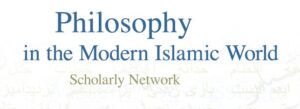TransIranIdea – Mīrzā Āqā Khān Kermānī and the Transregional History of Enlightenment
TransIranIdea is a research project on the history of philosophy and ideas in the 19th and 20th centuries (funded by the German Federal Ministry of Education and Research). The overarching goal of the project is to correct the grand narrative or metanarrative of the Enlightenment through a trans-European perspective. Until today, the Enlightenment as an intellectual phenomenon or as an epoch in the history of ideas is mostly presented as the exclusive heritage of Europe or “the West”. Non-European developments are thereby assigned at best an epigonal character. Through the lens of a non-European “micronarrative” provided via a set of detailed studies focussing on the Iranian thinker Mīrzā Āqā Khān Kermānī (1853-1896) his oeuvre and significance, exemplary writings on the concept of nation, religious criticism, and philosophical positivism are examined, which the intellectual and regime critic wrote from 1886 – 1896 in his exile in the Ottoman Empire (primarily Istanbul). This challenges Eurocentric approaches to the history of the Enlightenment and instead focuses on its intrinsically transcultural interconnections.
The examination and contextualization of Mīrzā Āqā Khān Kermānī’s writings takes place on several levels.
- Inventory of Kermānīs writings. Mīrzā Āqā Khān Kermānī’s writings were mostly published posthumously, some of them only at the end of the 20th century, some of them previously unpublished. The project aims to provide as accurate a sifting and annotated list of works as possible, including editions, edition history, and localization and description of existing manuscripts and lithography. Annotated transcriptions of selected MS of hitherto unedited works (not critical editions) will also be conducted.
- Intellectual Biography in Context. The project examines intellectual discourses and the circulation of texts and concepts in the context of the Iranian exile community in Istanbul in the late 19th century through the lens of Mīrzā Āqā Khān Kermānī’s intellectual career in context.
- Thematic Textual Analysis. Selected writings of Mīrzā Āqā Khān Kermānī are examined regarding the writings, concepts, and ideas of the Enlightenment discourse, Islamic history of ideas, and Babism as received by the author in relation to three main topics Kermānī dealt with: critique of religious dogmatism, nationalism, and philosophical positivism.
- Contextualization & Methodological reflections. Mīrzā Āqā Khān Kermānī’s work, activity, and ideas are interpreted in the context of and as a contribution to a transregional history of Enlightenment ideas and their significance for the re-conceptualisation of the Enlightenment.
- Arrangement of bio-bibliographical research data. Kermānī’s writings are specifically examined for references to texts, persons, concepts, and discourses in the history of Islamic and European ideas. This data will not only be incorporated into the thematic and contextual studies, beyond that the project also aims at the digital processing of this research data (biographical, bibliographical and terminological) in an internal project database, which will make these transregional interconnections and networks visible and usable for further research. The Website TransIranIdea will successively make this data accessible.
On the one hand, the project TransIranIdee makes a contribution to the modern history of ideas in Iran by examining the writings of an important and at the same time ambivalent Iranian thinker of the late 19th century. On the other hand, by incorporating theoretical approaches to the global history of ideas, it shows that Kermānī’s work can be understood as part of a transregional history of the Enlightenment that is able to overcome its Eurocentric narrative. To this end, Kermānī’s writings will not only be discussed text-immanently, but also examined in terms of the ways in which he connected various currents of European Enlightenment discourse as well as Islamic intellectual history, including the religious reform-movement of Babism. In addition, his thought is considered in a synchronic-comparative perspective by examining it exemplarily in relation to European discourses on the concepts of nation and religion. The studies and the digitally processed research data should ultimately serve as a model for a history of ideas that overcomes the Eurocentric narrowness.
Project relevant links and media content
- Podcast “Aufklärung transregional” (in German)
- “Gottesbeweise in einer verflochtenen Philosophiegeschichte“
Further media contributions
- BBC-Farsi: “پرگار: فلسفهی امانوئل کانت” – Interview (Video & Audio)
- Kant lesen in Teheran (Süddeutsche Zeitung)
- Interview about Kant in Teheran in the jounal Farhang-e Emruz (in Farsi)
